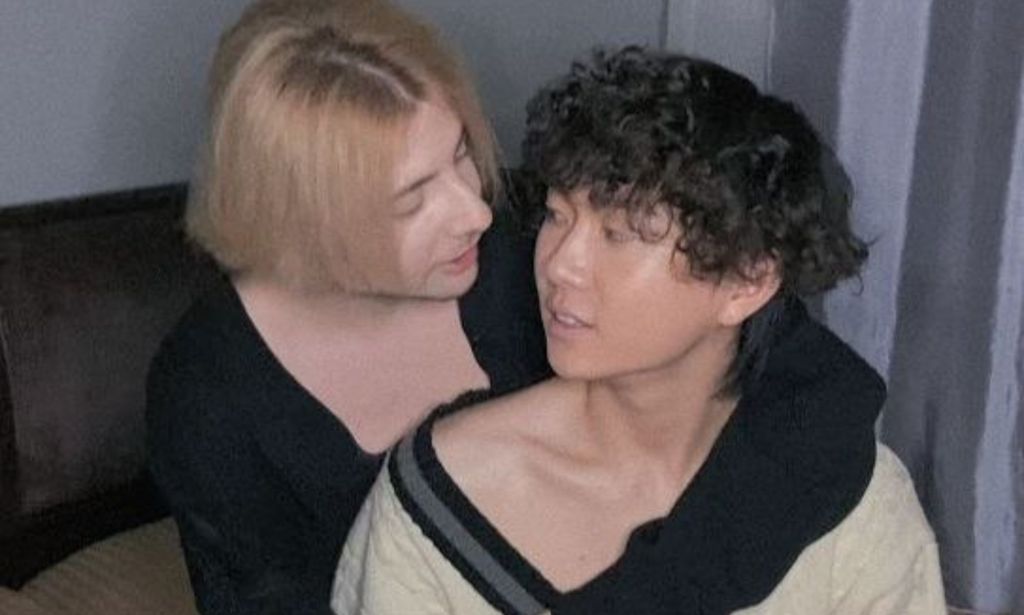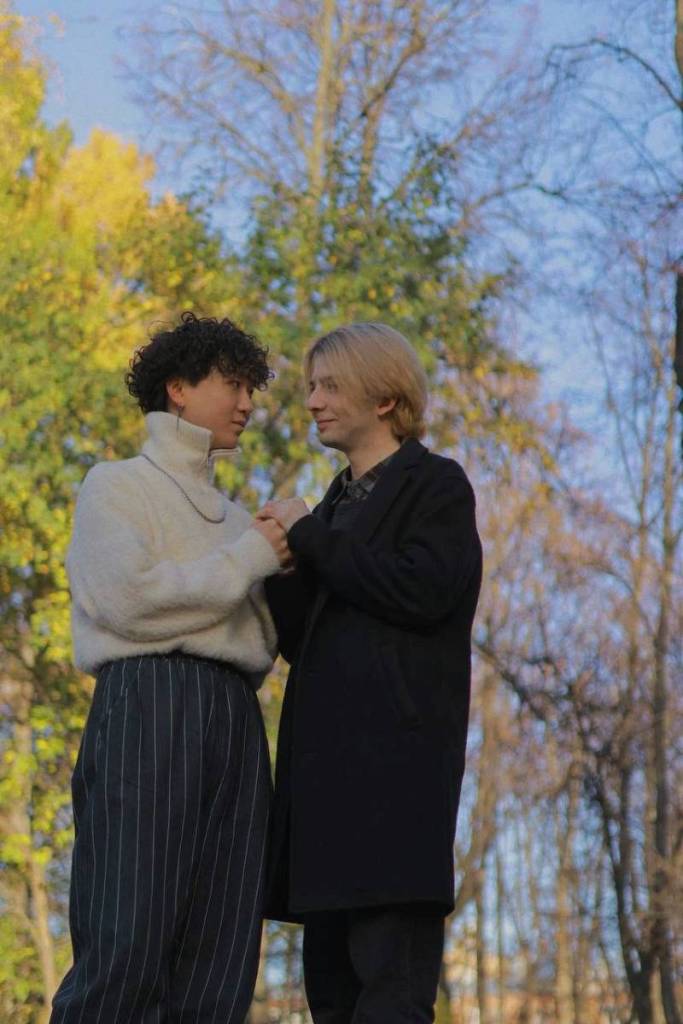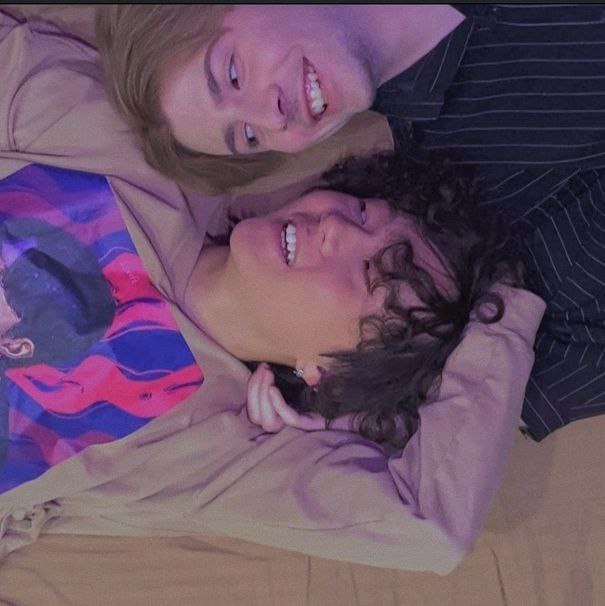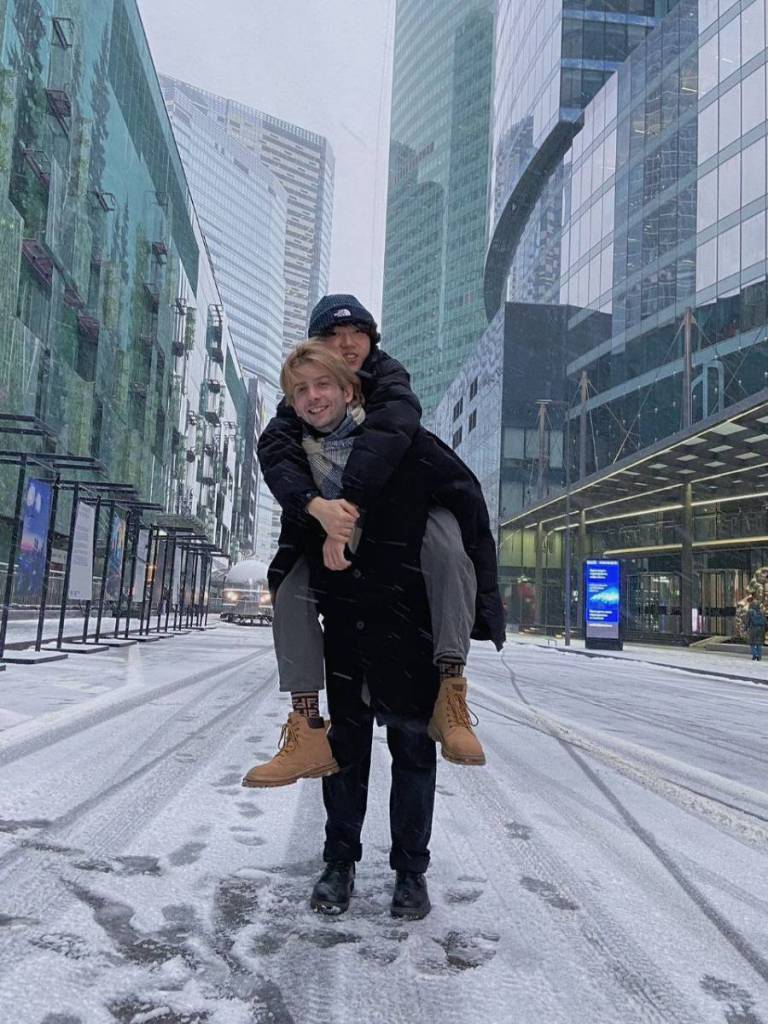Student arrested under Russian ‘LGBTQ+ propaganda’ law ‘kept in inhumane conditions’

Russia-based couple Haoyang Xu and Gela Gogishvili have faced immense homophobic abuse and arrest for posting content about their relationship online. (Provided)
A queer Chinese student living in Russia is enduring homophobia, racism and inhumane treatment after being arrested under the country’s ‘LGBTQ+ propaganda’ law.
Haoyang Xu and Gela Gogishvili upload videos to YouTube and TikTok depicting their lives as a loving couple. They kiss, dance or do a TikTok trend.
It’s so normal that viewers might be remiss if they forget that they are an openly queer, interracial, non-Slavic couple living in Russia under president Vladimir Putin’s notoriously anti-LGBTQ+ regime.
The two men were detained on 5 April over accusations of violating Russia’s ‘LGBTQ+ propaganda’ law by posting about their lives to their social media channels. They face hefty fines and further arrest, while Haoyang remains in detention, awaiting deportation.
Gela tells PinkNews – via interpretation by Anna-Maria Tesfaye, co-founder of Queer Svit – that Haoyang has been kept in inhumane conditions since being arrested at a Burger King restaurant in Kazan.

Haoyang, a Chinese student, was stopped by police for a document check. After he failed to present his passport and registration documents, he had Gela bring them to the restaurant, but both men were arrested.
Gela describes being held for “more than three hours” as police demanded to see his documents while he pleaded to see his lawyer.
While Gela was released, Haoyang was kept in detention, where he “basically had to sleep on a cold stone”.
Tesfaye, translating for Gela, says: “They didn’t pass the things that Gela brought to him – not clothes, not food, nothing – and the next day, there was a court hearing, which was very fast, and a lot of documents appeared which they never signed.
“And basically, the court didn’t care about all the things that the police did wrong. They were not doing the legal procedures correctly, but they [the court] didn’t care.
“So they said that he is guilty. He should be deported.”
Gela describes how his boyfriend was first sent to a place with “criminals who were pretty dangerous” before being transferred to the “Russian version of ICE” (Immigration and Customs Enforcement) for people facing deportation.
He says Haoyang was subjected to homophobic and racist abuse from authorities while detained, and forced to drink dirty water. Gela mentions one example where police asked Haoyang: “So in China, you like to do it in the a** right?”
He was only able to “pass some food to him and clothes” to Haoyang after he and the couple’s social media followers kept calling the authorities..

“It’s really funny to see when in Russian news they say that Haoyang is being kept in wonderful conditions and has his own room – well not his own room, he has a nice room,” Tesfaye says.
“It’s very far from comfortable or even human conditions. And well, in general, keeping a person who is not guilty of anything in such conditions, it’s very traumatising in general.”
The couple’s arrest comes after lengthy battle with bigots in Russia over their heartfelt social media content.
Gela, who is ethnically Georgian, grew up in Moscow in an “orthodox Georgian homophobic family”. He was “completely closeted” until he was 20 years old, and when he did come out, his parent’s “did not accept him”.
The couple met online after Gela was swiping through online dating app Badoo in December 2020 and came across Haoyang’s profile.
Gela was a “bit stunned” because he’d “never seen such [a] beautiful person” in his life, and he decided to shoot his shot.
“Haoyang answered: ‘I won’t be interesting to you. I’m boring and stuff’,” Tesfaye translates for Gela. “And Gela said, ‘We’ll see.’”
The pair bonded over their shared love of music. Gela says he’s a “multi-fandom w***e” with a deep love for Korean pop groups like BTS, XO, SHINee, Astro and Blackpink.
Haoyang, on the other hand, is a “crazy fan” of Taylor Swift, and Gela says his boyfriend “would be happy to sell his kidney to get to her concert”.

Gela recalls when Haoyang first visited him in Moscow. He says they were “thinking they will probably not be able to do long distance”, but he eventually made his feelings clear.
“In the last day, they were talking a lot, and basically, Gela turned to Haoyang and said, ‘Will you be my boyfriend?’” Tesfaye translates. “And Haoyang agreed, and that’s how they decided to stay together.”
The men initially filmed dance or trend videos for Gela’s TikTok before they decided to eventually be open about their love for each other on social media.
“They wanted to make these videos to show people how they live, how everything is going and that they’re just usual, common people and they’re not different in any way from anyone,” Tesfaye translates.
“It’s basically they’re just living their life, and there is nothing crazy or progressive or anything about queer people.”
Gela says they would get comments from “homophobes”, “wishing them death and anything basically [not] good”.
In the weeks following Russia’s invasion of Ukraine, the Kremlin criminalised anything it deemed ‘false information’ about the war or state entities. In response, TikTok suspended livestreaming and new content on the app for Russia-based users.
Then in December, Putin signed a law which significantly broadened the scope of 2013 legislation which prohibited the dissemination of LGBTQ-related information to minors.
The updated legislation extended the ban on promoting such information to adults as well, and it’s been used to crackdown on queer content in everything from books to content on social media.

Gela and Haoyang changed where their videos were filmed from, routing them through Kazakhstan, but the abuse endure. Even now, they continue to face immense hatred from homophobic groups in Russia as well as continued investigations from police into their content.
Like Haoyang and Gela, LGBTQ+ people face immense discrimination and stigmatisation in Russia.
Tesfaye helped found Queer Svit to help people like Gela and Haoyang find safety and support. The grassroots organisation helps LGBTQ+ folks and people of colour affected by the war in Ukraine as well as by repressions in post-Soviet Union countries.
She says it’s “very dangerous” for queer people, especially trans folks and LGBTQ+ people of colour, who decide to stay in Russia.
“In general, it is very heartbreaking and scary that the people who are already stigmatised and very traumatised by everyone… they can’t have any support from anyone, and they will not be supported,” Tesfaye says.
“They will be persecuted for being themselves. I would say that this is why we exist. I wish our organisation would never exist, and we will never have to learn which places are the most queer-friendly and … not very racist.”
She explains how it’s especially disheartening to see Russia’s ongoing anti-LGBTQ+ regime given the popularity of Russian music duo t.A.T.u. in the early 2000s. The duo were portrayed as being in a lesbian relationship, although the singers later denied being together.
“I was raised on t.A.T.u. songs, and it was, for me, I think maybe this is when I realised my sexuality and started thinking about my gender,” Tesfaye says. “This is really strange and sad that it went in a completely wrong direction.”
Queer Svit has launched an appeal to support the LGBTQ+ couple – both financially and to raise awareness of their story – as Haoyang still faces imminent deportation from Russia to China.
Colleagues from another group, Delo LGBT, are providing the couple with legal aid and representing them in courts while Queer Svit is working in the background to help Haoyang and Gela as much as they can.

